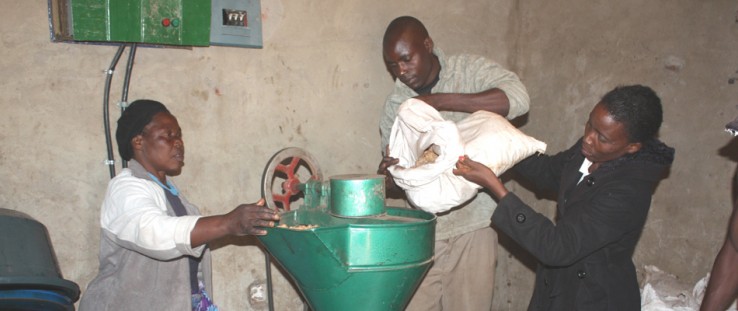 Vainess Phiri, right, and company load peanuts into the expeller.
USAID
Vainess Phiri, right, and company load peanuts into the expeller.
USAID
 Vainess Phiri, right, and company load peanuts into the expeller.
USAID
Vainess Phiri, right, and company load peanuts into the expeller.
USAID
In the under-developed, rural farmlands of Zambia’s Eastern province, the peanut is a choice crop, especially among women. Peanuts add protein to diets and bring cash needed for school fees and other important family expenses. Because of this, USAID has focused on helping farmers in Eastern province grow and market greater amounts of the crop through President Barack Obama’s flagship U.S. global hunger and food security initiative, Feed the Future.
One Feed the Future project is introducing improved peanut varieties to smallholder farmers and teaching them how to grow them. The project also works with local firms to expand peanut oil and butter production and sales to local and regional markets, bringing more money back to the farmers.
Experiences from other countries show, however, that with the commercialization of agricultural products, men often take on the majority of new opportunities and sometimes take over production and marketing. The Feed the Future project in Zambia is taking on the challenge of doubling peanut yields in Eastern province while ensuring women have opportunities to participate in—and benefit from—production and trade.
How exactly does Feed the Future help empower women to have these opportunities? “By giving them the tools and training they need to stay competitive,” says Anna Toness, USAID/Zambia economic growth team leader.
One example of the project’s impact can be found with Gladys Dhaka, 57, who has been a member of the Katete Women’s Development Association for many years. The association, with support from Feed the Future, empowers women in local communities to engage in agricultural activities—including growing peanut crops—through technical, economic and social training. But up until recently, Dhaka admits their success has been limited: “We have empowered women socially but not economically.”
Through USAID, Feed the Future is working in partnership with the Zambian Government Agricultural Research Institute to introduce improved hybrid seed varieties and train women like Dhaka to become certified seed growers of these higher-quality seeds, which fetch a premium price. Her main customer will be the association itself, which will distribute seeds to more of its members to increase the number of women involved in peanut production.
Dhaka’s husband is proud: “I’m not jealous of her. We decide together. We sit down together and discuss.”
And Dhaka has a newfound respect for the association: “With the Women’s Development Association, I will go somewhere from where I am.”
Women are also gaining access to advanced processing technologies. Vainess Phiri, program coordinator for the Katete Women’s Development Association, manages a peanut oil expeller the association purchased with a Feed the Future grant. The oil expeller means the association can enter into peanut processing and marketing, areas often dominated by men.
Of the association’s 3,500 members, almost 1,000 of them grow peanuts. With the association in the oil-processing business, these women have a ready market for their crop.
“Now we can buy peanuts from our members and increase benefits by selling the processed oil,” says Phiri.
The expeller—a compact, electric press—is operated by a man who is employed by the association. He is training association members to operate and maintain the expeller.
When asked what the expeller means to the association, Phiri sums it up in one word: “Sustainability. The money we make from the oil will allow us to continue our projects after our donor support has stopped. If we are to keep empowering our women, we need to be able to make our own money and not always depend on others.”







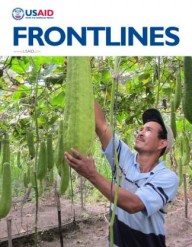

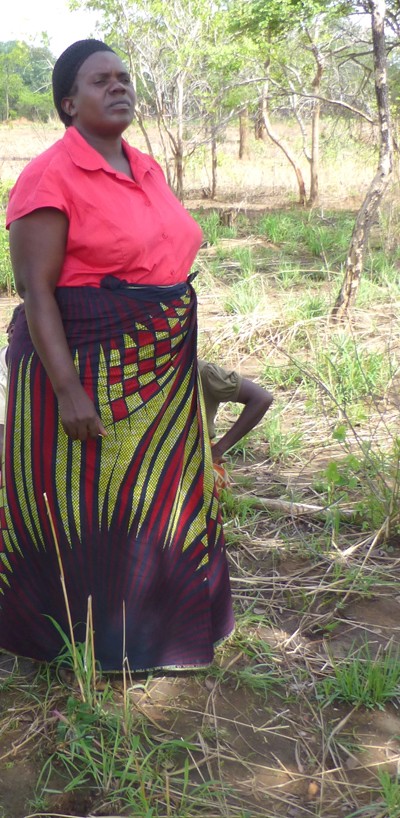
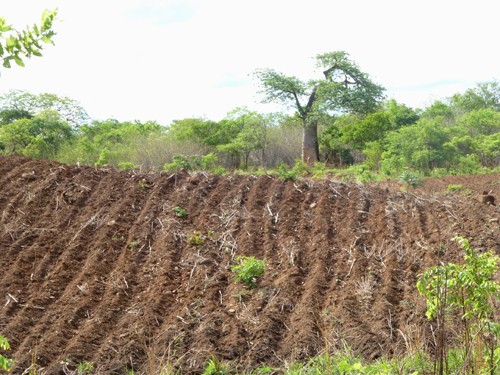
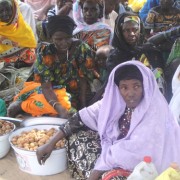
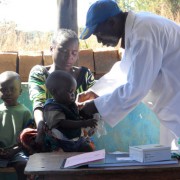
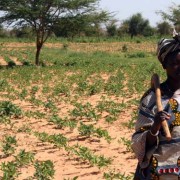
Comment
Make a general inquiry or suggest an improvement.